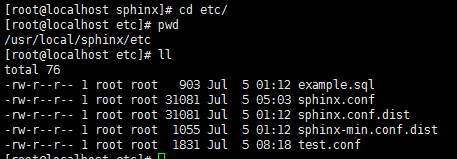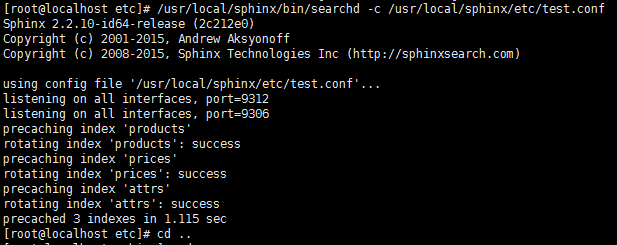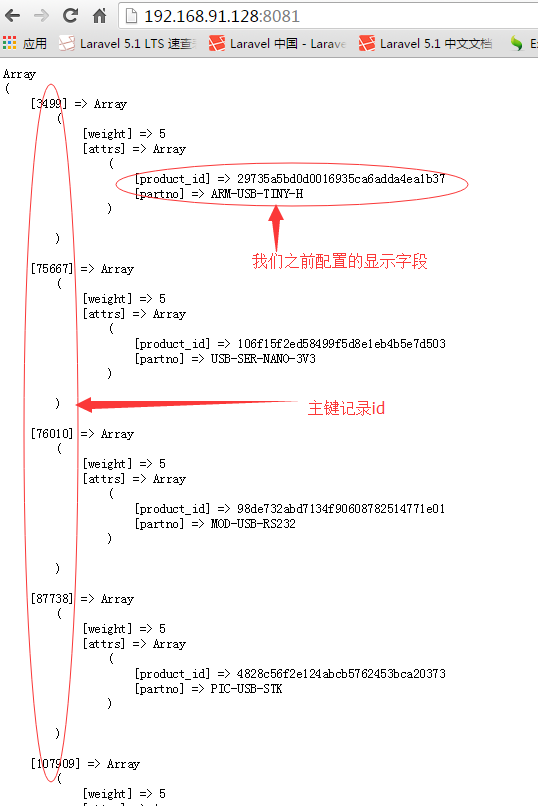公司项目刚刚导入大量产品数据,然后发现网站的产品搜索很卡,原本是原生sql的like来做模糊搜索,数据量20W的时候还可以接受,但是上百万就很卡了,所以需要做优化。
经过考虑,打算采用全文检索 sphinx + 数据库中间件(atlas/mycat) 的架构来优化.
我的环境:
centos6.5 64位
lnmp1.3一键环境包

CentOS6.4 X64 安装sphinx及sphinx for php扩展
安装前请先确定安装了常用的组件,然后在官方网站下载最新的sphinx,
yum install -y python python-devel
http://sphinxsearch.com/downloads/release/
安装sphinx
tar zxvf sphinx-2.2.10-release.tar.gz cd sphinx-2.2.10-release ./configure --prefix=/usr/local/sphinx –-with-mysql make && make install
在make时如果出现undefined reference to libiconv的错,请参考 http://www.lvtao.net/database/sphinx-make-error.html 解决方法
libsphinxclient 安装(PHP模块需要)
cd api/libsphinxclient ./configure –prefix=/usr/local/sphinx make && make install
安装PHP的Sphinx模块
下载地址:http://pecl.php.net/package/sphinx
wget http://pecl.php.net/get/sphinx-1.3.0.tgz tar zxf sphinx-1.3.3.tgz cd sphinx-1.3.3 /usr/local/php/bin/phpize ./configure --with-php-config=/usr/local/php/bin/php-config --with-sphinx=/usr/local/sphinx/ make && make install
添加php扩展库
查看php.ini位置
php --ini

编辑配置
vi /usr/local/php/etc/php.ini
:$ 跳至文件尾部
extension_dir="/usr/local/php/lib/php/extensions/no-debug-non-zts-20131226/"
[sphinx]
extension=sphinx.so
php -m 或者 phpinfo() 查看是否已经加载扩展

首先我们得在服务器端把索引建立好,以便php通过端口访问获取
复制默认配置文件,重新创建一个配置文件
cp /usr/local/sphinx/etc/sphinx-min.conf.dist /usr/local/sphinx/etc/sphinx.conf

sphinx.conf.dist是完整版默认配置,有很多内容,我这里选择复制的是sphinx-min.conf.dist迷你版,只要满足基本查询需要即可
#
# Minimal Sphinx configuration sample (clean, simple, functional)
#
source src1
{
type = mysql
sql_host = localhost
sql_user = root
sql_pass = root
sql_db = allchips_test
sql_port = 3306 # optional, default is 3306
sql_query = select * from products
#sql_attr_uint = id
#sql_attr_timestamp = date_added
sql_field_string = product_id
sql_field_string = partNo
}
source src2
{
type = mysql
sql_host = localhost
sql_user = root
sql_pass = root
sql_db = allchips_test
sql_port = 3306 # optional, default is 3306
sql_query = select * from product_prices
}
source src3
{
type = mysql
sql_host = localhost
sql_user = root
sql_pass = root
sql_db = allchips_test
sql_port = 3306 # optional, default is 3306
sql_query = select * from product_attrs
}
index products
{
source = src1
path = /mnt/data/products
min_infix_len = 1
infix_fields = partNo,short_desc
}
index prices
{
source = src2
path = /mnt/data/prices
}
index attrs
{
source = src3
path = /mnt/data/attrs
}
indexer
{
mem_limit = 128M
}
searchd
{
listen = 9312
listen = 9306:mysql41
log = /mnt/data/log/searchd.log
query_log = /mnt/data/log/query.log
read_timeout = 5
max_children = 30
pid_file = /mnt/data/log/searchd.pid
seamless_rotate = 1
preopen_indexes = 1
unlink_old = 1
workers = threads # for RT to work
binlog_path = /mnt/data
}
最下面的indexer和searchd分别是索引创建,和查询命令的配置,基本只要设置好自己想要日志路径即可
重要的上面的部分,source (来源) 和 index (索引)
分析一下我的需求,我的产品搜索主要3张表
产品表products, (id,product_id)
产品价格表product_prices,
产品参数表product_attrs
三者以产品表的product_id关联1对多
source src1 对应 index products
source src2 对应 index prices
source src3 对应 index attrs
在source中是可以设置自定义返回的字段的
如上面的
sql_field_string = product_id
sql_field_string = partNo
配置好了之后,创建索引
在使用 /usr/local/sphinx/bin/indexer -c /usr/local/sphinx/etc/sphinx.conf --all --rotate 命令的的时候,如果searchd进程没有在监听,执行了更新,会出现no rotate的提示。
如果不想全部生成你可以不用--all,分开多个源生成也可以

/usr/local/sphinx/bin/indexer -c /usr/local/sphinx/etc/sphinx.conf products
/usr/local/sphinx/bin/indexer -c /usr/local/sphinx/etc/sphinx.conf prices
/usr/local/sphinx/bin/indexer -c /usr/local/sphinx/etc/sphinx.conf attrs
如果没有什么问题一般是这样的。

接下来要用searchd作为sphinx在服务器的守护进程
/usr/local/sphinx/bin/searchd -c /usr/local/sphinx/etc/sphinx.conf(途中的test.conf是以前测试的,使用sphinx.conf即可)

一般如果报错
文件夹不存在,则创建文件夹
如果已经端口进程已经在运行,那么有2种方法停止
1,/usr/local/sphinx/bin/searchd -c /usr/local/sphinx/etc/sphinx.conf --stop
2, netstat -tnl 查看端口9312是否在监听
lsof -i:9312 查看9312端口信息,获得pid
kill {pid}
杀掉进程之后重新执行searchd命令启动
==========
php端
<?php //index.php phpinfo();die; $s = new SphinxClient; $s->setServer("127.0.0.1", 9312); $s->setMatchMode(SPH_MATCH_PHRASE);
//$s->setSortMode(SPH_SORT_ATTR_DESC,'is_tuan'); //指定模式
$s->setSortMode(SPH_SORT_EXTENDED,'is_tuan desc'); //扩展模式
$s->SetFilterString('status','1'); //这个字段 需要在 sql_attr_string 中设置显示,不然找不到字段 如果设置的是sql_attr_uint就是int ,后面是类型
$s->setMaxQueryTime(30); $res1 = $s->query('usb','products'); $res2 = $s->query('53e6dde17a667c4b2af1d38ba0a466c4','prices'); $res3 = $s->query('53e6dde17a667c4b2af1d38ba0a466c4','attrs'); //$res = $s->query('开关','products'); //$res = $s->query('products'); $err = $s->GetLastError(); //var_dump(array_keys($res['matches'])); // echo "<br>"."通过获取的ID来读取数据库中的值即可。"."<br>"; echo '<pre>'; $products=!empty($res1['matches'])?$res1['matches']:""; $prices=!empty($res2['matches'])?$res2['matches']:""; $attrs=!empty($res3['matches'])?$res3['matches']:""; print_r($products); print_r($prices); print_r($attrs); if(!empty($err)){ print_r($err); } $s->close();
coreseek的官网挂了下载不了,所以暂时不弄中文。以后看有时间在下载个中文词典打进去

这是打印的query返回的matches匹配结果,如果要查看整个query结果,可以看PHP手册http://php.net/manual/zh/sphinxclient.query.php
| 键 | 值说明 |
|---|---|
| "matches" | 存储文档ID以及其对应的另一个包含文档权重和属性值的hash表 |
| "total" | 此查询在服务器检索所得的匹配文档总数(即服务器端结果集的大小,且与相关设置有关) |
| "total_found" | (服务器上找到和处理了的)索引中匹配文档的总数 |
| "words" | 将查询关键字(关键字已经过大小写转换,取词干和其他处理)映射到一个包含关于关键字的统计数据(“docs”——在多少文档中出现,“hits”——共出现了多少次)的小hash表上。 |
| "error" | searchd报告的错误信息 |
| "warning" | searchd报告的警告信息 |
上面的配置默认监听了,9312和9306端口,9312是给php程序链接的,9306是本地数据库调试端口,如果想要在服务器做测试,可以试试链接
mysql -h127.0.0.1 -P9306

products是索引名index,match是规则匹配,
use sngrlSphinxSearchSphinxSearch; class TestController extends Controller { public function index(Request $request) { $sphinx = new SphinxSearch(); $sphinx->setMatchMode(SphinxSphinxClient::SPH_MATCH_PHRASE); $results = $sphinx->search("%PSMN1R1-25YLC,11*", 'products')->query(); $error=$sphinx->getErrorMessage(); $products=!empty($results['matches']) ? $results['matches'] : array(); echo '<pre>'; print_r($products); //dd($results); //dd($error); } }
匹配成功。
================================================================
Atlas听说很多人都在用,安装测试中 待续 -